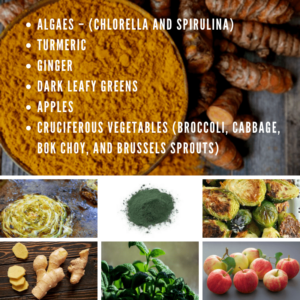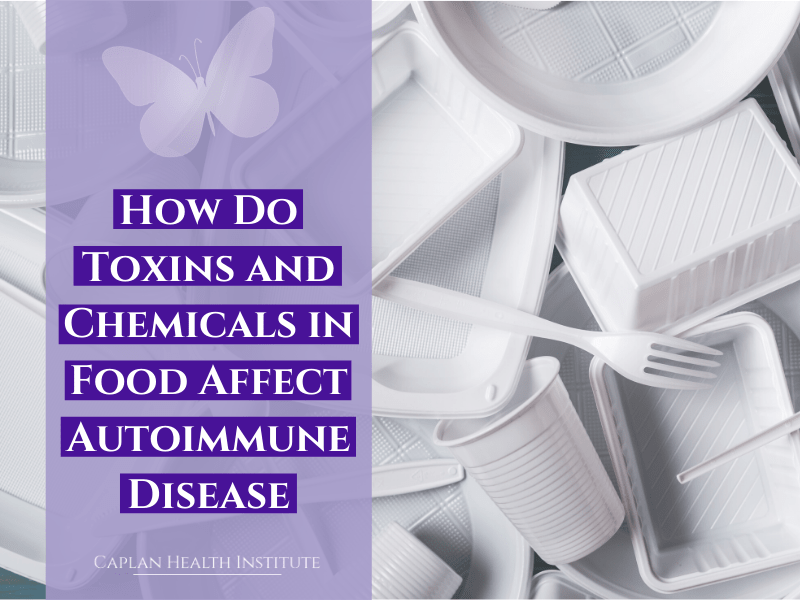One of the problems with autoimmune disease of any kind is that the triggers of inflammation are vast and sometimes insidious. Let’s take a look at the avenues for most toxins and toxic chemicals and how they affect nutrition and autoimmune disease
Minimizing Toxic Exposure from Food
When it comes to toxic food exposures, it’s not just what you are eating that makes a difference, but also how the food is handled and prepared (again, insidious!). Some types of food preparation can turn healthy food into a health hazard. Three main things to consider are the foods themselves, the packaging, and the preparation.
Nutrition and autoimmune disease is a complicated issue that can be managed with effort and persistence.
Packaging
Always avoid plastic casings, aluminum or metal cans, foil, and cellophane. Exposure to these materials affords the opportunity of food and beverages to leach harmful chemicals into the food or drink and then, yes, into your body. Remember that heat makes this worse. Don’t use a plastic water bottle that’s left in the car, right? Don’t heat food in a plastic container. Avoid barbecuing in aluminum foil.
Food Preparation
Choose water (steaming or boiling) over frying in oil, and choose non-toxic cookware. Avoid fried foods and overcooked/charred foods. AGEs (advanced glycation end-products) are formed when foods are charred or over-browned. (AGEs are likened to rusting that happens when the natural sugars in food are overcooked.)
The three basic food preparation factors that affect nutrition and autoimmune disease include time, temperature, and cookware. As a general rule of thumb, slow, low, and moist is the healthiest way to cook. 🙂
Time
Slow cooking as in a slow cooker (or a little faster in an instant pot) is a great, non-toxic way to maintain nutrients while minimizing lectins and avoiding AGEs (remember, those are caused when foods are charred or over-browned).
Temperature
Cook at lower temperatures to help avoid unwanted toxins by minimizing AGEs, trans-fats and preserving the nutrients in the food.
Lightly steam vegetables to help activate the natural enzymes and preserves the phytonutrients like sulforaphane. This gives the antioxidant boost from our plant foods.
When cooking with a fat or oil, choose one that has a higher smoke point or one that contains more saturated fat, such as coconut oil or ghee. Cooking with oil at a higher temperature can cause some oils (like olive oil) to lose their health benefits or be converted into a more toxic form. (Save olive oil for drizzling on food after cooking for the most health benefits.)
Cookware
The coating used to make non-stick cookware is very often extremely toxic. Choosing healthier cookware such as ceramic or cast iron will help you avoid cooking chemicals into your food. Also, pay attention to utensils when cooking. Use metal or bamboo tools and avoid using plastics, especially when cooking over heat is involved. (This can help with nutrition and autoimmune disease.)
Foods That Help with Detoxing (Managing Nutrition and Autoimmune Disease)
There are foods you can eat to help your body’s natural detox process get rid of toxins. Adding more good foods into your diet gives your body the nutrition and ingredients necessary to naturally detox. Aim for 9-13 servings of plant foods in your daily diet, including fiber-rich foods and cruciferous vegetables to help support the body’s natural detox abilities. Keeping your PERSONAL physiology in mind, consider:

- Algaes – (chlorella and spirulina): Contain protein and vitamins and are great detoxing agents as they help bind to and eliminate metals from the body.
- Turmeric – An anti-inflammatory and an antioxidant that aids in detoxification by impacting gallbladder function, therefore supporting the bile production needed for detoxification.
- Ginger – An anti-inflammatory and an antioxidant that aids in detoxification by acting as a stimulant for the digestive tract and helping bowel function and circulation to move out of the body.
- Dark leafy greens – Full of phytonutrients and fiber, which helps the bowel eliminate waste in the bowels.
- Apples – Great source of fiber and also high in malic acid, which helps cleanse the blood.
- Cruciferous vegetables (broccoli, cabbage, bok choy, and brussels sprouts) – Full of sulforaphane, a chemical known for its stimulation enzymes involved in detoxification processes as well as its antioxidant effects.
Creating a Hypoallergenic Home
Have you ever noticed that some of your health problems seem to go away or lessen when you are on vacation, spend time at someone else’s house, or out of town for a while?
That might be because there are hidden sources of toxins and allergens around us all the time, especially in our homes. Indoor air has been shown to be up to ten times more polluted than outdoor air, and a lot of it has to do with what we are using indoors. In fact, one of the most toxic things that many of us have and use in our homes is a dishwasher! The fumes that come from washing plastics in the dishwasher are toxic, and we then breathe them in. But what about other sometimes invisible sources of toxins or allergens, such as mold and dust mites? How do we protect ourselves from these invisible dangers?
Helpful Rules of Thumb to Manage Nutrition and Autoimmune Disease
- Properly test your environment. If you believe you may have a mold or bacteria problem in your home, you can purchase a home test kit or hire professionals to inspect and treat any problem areas.
- Control indoor humidity. Mold. Loves. Moisture. Period! Make sure places such as the bathroom and kitchen have good circulation or leave windows open when possible to prevent mold growth.
- Minimize animal allergens. For many of us, our pets are part of the family and share the same living space (couch, beds, etc.). If someone in your household is allergic to pet dander, it is best to avoid letting the pet into their bedroom. It is also recommended to consistently dust, vacuum, and wash bedding or linens to remove pet dander and purchase a HEPA air filter to minimize allergens in the air.
- Use filters. Air and water filters can help minimize toxic exposure by removing pollutants in the water we drink and the air we breathe. A simple countertop water filter can turn tap water into bottle-quality water without the harmful microplastics found in such bottles. Air filters can be installed in air ducts and vents or stand-alone HEPA filters can be used throughout the house.
Lifestyle Tips For Minimizing Toxic Exposure At Home
4 things to Avoid:
- Chemicals in personal care products such as lotions, moisturizers, shampoos, conditioners, makeup, sunscreen, etc.
- Inhalants and environmental toxicants such as air fresheners, scented laundry detergents, fabric softeners, candles, household cleaners, etc.
- Toxins from mold, dander, dust mites
- Smoke and other pollutants by using air and water purifiers
Habits That Help You Detox
Remember that exercise is great for detoxing. Exercise improves your circulation, creating better nutrient and oxygen distribution, and physically helps the body flush out toxic junk. Simply walking stimulates movement in the body, helping lymphatic drainage, gut motility, and sweating! Sweating can be achieved in ways other than exercise. You can produce a lot of sweat through the use of infrared or dry saunas and steam rooms. If you don’t have a sauna or steam room at home, check out a local gym or YMCA.
Another major source of toxins is in our everyday personal care products. Even things like toothpaste contain a multitude of chemicals that could be harmful. Think about your daily routine: lotions, deodorants, moisturizers, shampoo, conditioner, skin toner, exfoliant, makeup, hair products, etc. How many chemicals are you putting on your body every day? And yes, it matters what you put on your body, because those chemicals have the chance to be absorbed by our skin, and we can also inhale those chemical fragrances, resulting in immune reactions to them on our skin or in our respiratory system. Don’t forget that your skin is the largest organ of your body and many toxins are entering through the gateway daily.
Other Tips to Manage Nutrition and Autoimmune Disease ADD SUBHEADING
Look for products with minimal ingredients as well as ingredients that are easily identifiable. For example, try switching to castile soap such as Dr. Bronner’s. With minimal ingredients, it is not only safe but also multi-purpose. Castile soap can replace a number of household and personal care products such as body wash, dog shampoo, fruit rinse, dishwashing liquid, toilet scrubber as well as acting as an all-purpose cleaner!
Visit the Environmental Working Group’s website at www.ewg.org for more tips and safety ratings of a number of common products. It’s a great resource for learning more about your environment and how to minimize toxic exposures in everyday life.
Oral Health for Nutrition and Autoimmune Disease ADD SUBHEADING
One more area to address when it comes to toxic exposure is your mouth! If you have had any dental work done, such as mercury amalgams, crowns, alloy implants, and orthodontic appliances, these can be a source of exposure.
Find a biologic dentist. Biologic dentists are trained in safely removing practices of mercury amalgams, etc. But if removal isn’t an option, avoiding things such as chemical teeth-whitening agents and grinding your teeth can help minimize the release of these toxic substances into your body.
Cutting through what can be a lifelong prison sentence is our own intuition that something just isn’t right, and at that point, no matter where we are on the spectrum, we can take personal ownership and begin to change our lives.
“Let food be thy medicine” as Hippocrates said. But he did not know that we would face a world where our food would be fueled by pesticides, GMOs, and toxins.
When you hear the diagnosis of cancer or Alzheimer’s or rheumatoid arthritis, you often skip straight to the progression of disease. With autoimmune disease, however, not only can things fluctuate daily, you can go into remission.
The fact is that you have a lot more control over your health, especially by reducing toxins. And sometimes, a diagnosis can be a blessing in disguise if it prompts you to make healthier decisions.
An autoimmune diagnosis is an invitation to make necessary changes to not only arrest or reverse that condition but to prevent future autoimmune conditions. Managing your nutrition and autoimmune disease is completely possible with dedication.
If a doctor gives you a diagnosis of an autoimmune disease and tells you there’s nothing you can do – get a different healthcare practitioner and immediately seek to educate yourself about toxicity to support your energy and recovery.
Healthy Regards,
Dr. Tiffany Caplan & Dr. Brent Caplan
PS: Have fun exploring the creative and flavorful recipes in Dr. Caplan’s cookbook “Friendly Recipes to Calm the Fires of Inflammation.” These delicious recipes are great support for lowering inflammation due to lupus or other autoimmune disease symptoms.
PPS: Self-care is so important, and an essential component of conquering autoimmune disease. This is why my wife; Tiffany and I created the “Simple Self Care for Autoimmunity” e-book. This guide provides 8 simple and effective ways to practice self-care you can start today! It’s our gift to you! Download it now at no cost!



Leave a Reply